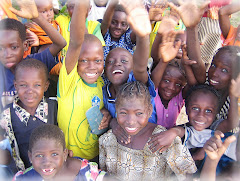It was a chilly (80 degrees)
morning when a Burkinabe friend arrived at my house. When it’s hot, I know how to be a good
hostess, offering water as the cultural way of expressing welcome, but since my
friend arrived wearing a stocking hat, I hesitated. Should I offer her water? The last time I’d done this on a “cold” day,
my guest had reacted like I’d offered him poison. Since then I’d noticed a pattern: people
actually believed drinking water in the morning or on a cold day could harm
them.
This time, however, my friend
accepted the water and sat with me on the porch to talk. A few minutes later, she noticed my
roommate’s pet tortoise and informed me with delight that tortoises were her
ancestors. This girl was not the typical
animist type; she’d just shared a testimony of growing up the daughter of a
pastor but realizing at 8 years of age that she needed to make her own decision
to believe in Jesus. But she told me how
each clan has a different animal as ancestor.
These ancestral animals are to be greatly respected: clans cannot eat
the meat of their particular ancestral animal, and they bury these ancestral
animals the same way they do humans, with elaborate funerals.
The culture is full of stories
about the ancestors and stories to explain why life is the way it is. For example, you may know that if you’re
driving along and see a goat in the road, it is likely that it will run off the
road, but if you see a sheep, this is most definitely NOT the case. However you may not have known that long ago
a goat and a sheep took a bus trip. At
the destination, the driver asked for their fares. The goat paid only half and ran away; now
every time he sees a car, he runs for fear that it’s the driver looking for the
other half. The sheep, however, paid with
a large bill. Instead of giving him his
change, the driver sped off, so now the sheep stubbornly waits in front of
every car, hoping to make the driver pay up.
For most people here, even
Christians, these stories and ideas are more than just amusing—they think they
are true. Sadly, mixed in among all
these false ideas is the idea that children can’t be saved. A good study of the Bible is all it takes to
prove that this isn’t true, but sadly many churches hear of the work that CEF
is doing and dismiss it because of an idea that you must be a certain age to be
saved.
So now the members of the committee and I are meeting
personally with pastors and Sunday School teachers, sharing with them about
God’s heart for children and asking them to partner with us to reach the
children in the neighborhoods all around Burkina Faso. It is my prayer that children all over will
hear God’s Word so that water doesn’t make them think of poison but rather of
the living water they can drink and never thirst again. It is my prayer that sheep in the road won’t
make them think of overpaid bus fares, but of Jesus’ promise to take care of us
like a shepherd cares for his sheep.


No comments:
Post a Comment